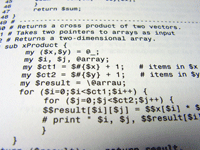|
FXRuby based on the FOX Toolkit, a popular open source C++ library developed
by Jeroen van der Zijp. What that means for you as an application
developer is that you are able to write code in the Ruby programming
language that you already know and love, while at the same time taking
advantage of the performance and functionality of a fully featured,
highly optimized C++ toolkit.
Although FOX does not have the same level of name recognition as some
other GUI toolkits, it has been available since 1997 and is still under
continuous development. FXRuby has been under development since
late 2000, and the first public release was in January 2001. I have been
the lead developer during that entire time, with a number of community
volunteers contributing patches along the way. It is a tricky proposition
to guess the size of the user community for an open source project, but
according to the RubyForge statistics there have been close to 45,000
downloads of FXRuby since the project was moved there (and almost
18,000 before that, when it was hosted at SourceForge). Questions
posted to the FXRuby users mailing list are often answered by myself,
Jeroen van der Zijp (the developer of FOX), or one of the other longtime
members of the FXRuby community.
|
The FOX toolkit is an open source, cross-platform widget toolkit, that is, a library of basic elements for building a graphical user interface (GUI). FOX stands for Free Objects for X.
It features a hard-wired Windows 95-style theme available for both Microsoft Windows itself as well as the X Window System (which is used on many UNIX and UNIX-like operating systems).[1]
The FOX toolkit has been released under the GNU Lesser General Public Licence. Development began 1997 by Jeroen van der Zijp while he was affiliated at CFDRC. Since then, Jeroen van der Zijp maintains the core library and test applications, with the help of a growing[citation needed] user community.
The FOX toolkit is written in C++, with language bindings available for Python, Ruby and Eiffel. The FOX source code distribution supports building with many different (commercial and free) C++ compilers.
|


